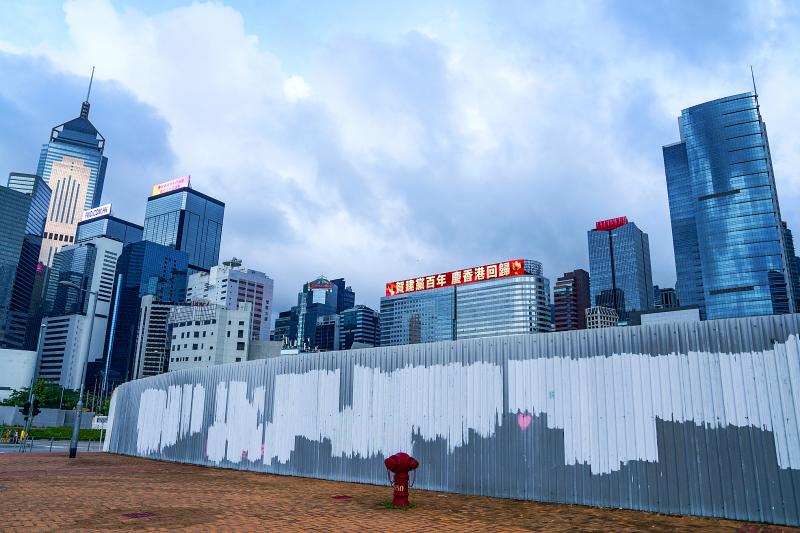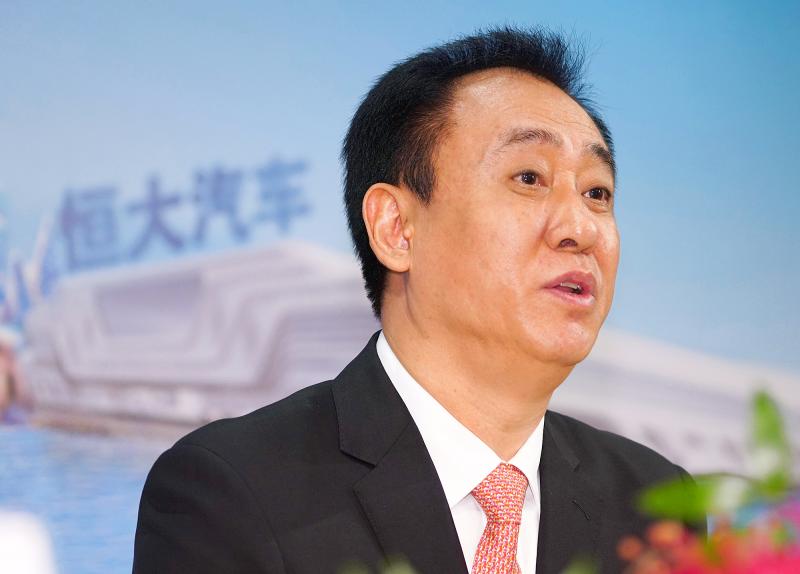From rural poverty to real estate billions, the fortunes of Evergrande Group (恆大集團) chairman Xu Jiayin (許家印) tracked China’s runaway growth for much of the past two decades — but now he is battling to save his conglomerate from a quagmire of debt.
The 62-year-old was at one point China’s richest man, with a taste for luxury labels, exclusive yachts and a nose for praising the Communist Party that steered the economy to a home ownership boom.
However, Evergrande is sagging under hundreds of billions of dollars of debt as fears mount of an imminent collapse that could ricochet across the world’s second-biggest economy.

Photo: Bloomberg
“China’s property developers — and their creditors — appear to be approaching a reckoning,” analysts at Capital Economics Ltd said in a note.
They warned that Evergrande is “close to collapse,” with large losses looming for banks, bondholders and home buyers.
Total liabilities had swelled to 1.97 trillion yuan (US$305.7 billion), the embattled group said last week, warning of the risk of default.

Photo: China News Service via CNA
Evergrande started to falter under the new “three red lines,” which were in August last year imposed on developers amid a crackdown by the Chinese government — forcing the group to offload properties at increasingly steep discounts.
Xu’s ascent mirrored China, rocketing from a largely rural and impoverished society to the gargantuan economy it is today.
The billionaire, whose mother died when he was one year old, recalled in a 2017 speech how he ate just sweet potatoes and steamed bread throughout his school years.
“The sheets I laid, the quilts I covered and the clothes I wore were all covered with piles of patches,” Xu said. “At that time, my greatest wish was to go out of the countryside, find a job and be able to eat better food.”
After leaving school in 1976 — the end of the decade-long Cultural Revolution — he struggled to find work.
As colleges reopened, Xu studied metallurgy and was later assigned to a state-run steel factory.
He left in 1992 for Shenzhen, the buzzing heart of China’s reform and opening-up experiment in the 1990s, before founding Evergrande in 1996.
All 323 apartments in the firm’s first completed project sold in half a day, and raked in 80 million yuan.
Evergrande threw itself into mass development, building in-demand apartments across China and capitalizing on its rapid wealth accumulation.
The group in 2009 listed in Hong Kong, raising HK$70.5 billion (US$9.1 billion at the current exchange rate) in its initial public offering, making it China’s largest private real estate company and Xu the country’s richest man with a net worth of 42.2 billion yuan.
In 2010, Xu bought an embattled Guangzhou soccer team, renaming it Guangzhou Evergrande and pouring money into world-class players and coaches.
A soccer novice when he bought the club, Xu helped the team win eight league championships.
He also cracked down on bad behavior, reportedly fining a player who challenged a referee and introducing the “five musts” — including “players must obey the referee’s judgement unconditionally.”
The group also invested in electric vehicles, tourism and bottled water.
According to the SuperYachtFan Web site, Xu is the owner of a US$60 million yacht.
He also has a private jet, which Australian media reported he used for scouting out Sydney development opportunities in 2014.
Xu also became known for a love of luxury labels, particularly French brand Hermes — earning the nickname “Belt Xu” after wearing a Hermes belt for the national political congress in 2012.
Some have speculated that his success has come from useful close relationships, including with the brother of former Chinese premier Wen Jiabao (溫家寶), but Xu has attributed his success to education — and the Chinese Communist Party.
“Without the resumption of the national college entrance examination, I am still in the countryside. Without a state grant of 14 yuan, I couldn’t go to university. Without the country’s reform and opening up, Evergrande is not what it is today,” he said. “Everything of Evergrande is given by the party, the state and the society.”
However, Xu is facing a government crackdown on extensive wealth, with Chinese President Xi Jinping (習近平) leading the country’s drive for “common prosperity” against billionaires and tech firms.
In 2017, the Bloomberg Billionaires Index estimated Xu’s wealth at US$43 billion — but that is now down to less than US$9 billion, having lost an eye-watering US$14.5 billion since the start of the year alone as the value of Evergrande collapsed.

MULTIFACETED: A task force has analyzed possible scenarios and created responses to assist domestic industries in dealing with US tariffs, the economics minister said The Executive Yuan is tomorrow to announce countermeasures to US President Donald Trump’s planned reciprocal tariffs, although the details of the plan would not be made public until Monday next week, Minister of Economic Affairs J.W. Kuo (郭智輝) said yesterday. The Cabinet established an economic and trade task force in November last year to deal with US trade and tariff related issues, Kuo told reporters outside the legislature in Taipei. The task force has been analyzing and evaluating all kinds of scenarios to identify suitable responses and determine how best to assist domestic industries in managing the effects of Trump’s tariffs, he

TIGHT-LIPPED: UMC said it had no merger plans at the moment, after Nikkei Asia reported that the firm and GlobalFoundries were considering restarting merger talks United Microelectronics Corp (UMC, 聯電), the world’s No. 4 contract chipmaker, yesterday launched a new US$5 billion 12-inch chip factory in Singapore as part of its latest effort to diversify its manufacturing footprint amid growing geopolitical risks. The new factory, adjacent to UMC’s existing Singapore fab in the Pasir Res Wafer Fab Park, is scheduled to enter volume production next year, utilizing mature 22-nanometer and 28-nanometer process technologies, UMC said in a statement. The company plans to invest US$5 billion during the first phase of the new fab, which would have an installed capacity of 30,000 12-inch wafers per month, it said. The

Taiwan’s official purchasing managers’ index (PMI) last month rose 0.2 percentage points to 54.2, in a second consecutive month of expansion, thanks to front-loading demand intended to avoid potential US tariff hikes, the Chung-Hua Institution for Economic Research (CIER, 中華經濟研究院) said yesterday. While short-term demand appeared robust, uncertainties rose due to US President Donald Trump’s unpredictable trade policy, CIER president Lien Hsien-ming (連賢明) told a news conference in Taipei. Taiwan’s economy this year would be characterized by high-level fluctuations and the volatility would be wilder than most expect, Lien said Demand for electronics, particularly semiconductors, continues to benefit from US technology giants’ effort

‘SWASTICAR’: Tesla CEO Elon Musk’s close association with Donald Trump has prompted opponents to brand him a ‘Nazi’ and resulted in a dramatic drop in sales Demonstrators descended on Tesla Inc dealerships across the US, and in Europe and Canada on Saturday to protest company chief Elon Musk, who has amassed extraordinary power as a top adviser to US President Donald Trump. Waving signs with messages such as “Musk is stealing our money” and “Reclaim our country,” the protests largely took place peacefully following fiery episodes of vandalism on Tesla vehicles, dealerships and other facilities in recent weeks that US officials have denounced as terrorism. Hundreds rallied on Saturday outside the Tesla dealership in Manhattan. Some blasted Musk, the world’s richest man, while others demanded the shuttering of his